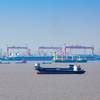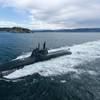China Crude Cargoes Stranded on VLCCs
About 4 million barrels of crude oil bought by a Chinese state trader for the country's strategic reserves have been stranded in two tankers off an eastern port for nearly two months due to a lack of storage.
The delays will cost millions of dollars and indicate how China is struggling to import record amounts of crude if storage and port capacity at Qingdao, its largest oil import terminal, are unable to keep pace.
Ocean Lily and Plata Glory, two very large crude carriers (VLCCs) carrying oil for Sinochem Corp, arrived at Huangdao, Qingdao's main oil terminal, in early September, and both were still at anchor this week, waiting to unload, according to Reuters' shipping data, and trade and port sources.
"They are both for SPR (strategic petroleum reserve), but no tank space is available to take that oil in," said a senior trader familiar with Sinochem's oil trading.
China's crude oil imports rose nearly 9 percent in the first nine months of the year over a year earlier to 6.65 million bpd, driven partly by reserve building.
China said late last year the first phase of the government's emergency stockpile is storing about 90 million barrels of crude oil, with the construction of a second phase due by 2020, partly through private investment.
Huangdao is the site of one of China's first SPR tanks, with space for 20 million barrels of oil and also has plans for a second phase of similar size.
A recent move to increase competition for oil imports by granting quotas to independent refineries has added to congestion at Huangdao, where operations were already hampered following a pipeline accident two years ago.
"Storage and berths were not ready for such a quick market opening," the trader said.
PORT CONGESTION
Huangdao has experienced cargo congestion since a pipeline explosion that killed 66 people two years ago, with tighter security checks and repairs to old and damaged pipelines slowing tanker unloading.
Congestion has worsened following a scramble by a raft of new crude buyers to bring in oil, trading sources have said.
Since July, China has granted a total of nearly 1 million barrels per day (bpd) of crude import quotas to a dozen independent refineries in an effort to boost competition and private investment.
The pace of the reform has been much quicker than the market expected, with the newly approved quotas making up more than 10 percent of China's current total imports.
Ocean Lily loaded oil from the Omani port of Mina Al Fahal, Reuters' shipping data on Eikon showed. It is unclear what crude Plata Glory is carrying.
The oil was part of a total of at least 6 million barrels of crude bought by Sinochem for government stockpiles, but destined for a commercial tank farm in the city of Weifang, connected with Huangdao with a pipeline, the trader and port source said.
The tank farm, with total storage of about 25 million barrels, is mainly owned by Shandong Hongrun Petrochemical Co, an independent refinery partly owned by Sinochem.
China's state reserves are split into two categories: strategic petroleum reserves for which the state builds tanks and pays the full cost of storage and oil, and commercial state reserves where the state leases tanks and shares the cost of buying oil with companies.
Sinochem officials did not respond to requests for comment, while a media official with Qingdao Port Group could not immediately comment. Reuters was unable to contact the Ocean Lily.
Broker reports show that Sinochem owns Ocean Lily, while Plata Glory was fixed on a six-month charter at around $37,750 a day in April, with an option to extend for another six months, putting the cost of keeping the two vessels idle at several million dollars.
Reporting by Chen Aizhu










